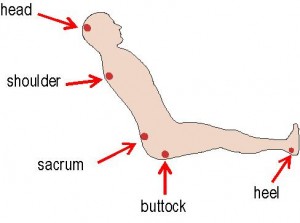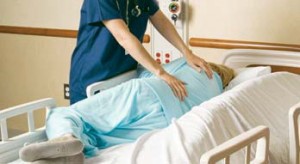As nursing home abuse lawyers in New Jersey and Philadelphia, it is important that we continue to expose some of the nursing homes and long term treatment facilities with large numbers of complaints, as well as a plethora of deficiencies cited by the New Jersey Department of Health and Senior Services. The nursing home we will discuss today is located in Cumberland County, New Jersey. The facility, located in Vineland, contains 180 long-term care beds and has one of the worst deficiency records that we have come across.
Lincoln Specialty Care Center Has Horrible Record
 The Lincoln Specialty Care Center has had 2 routine inspections between November 2008 and October 2010. During this time period, the facility had 57 cited deficiencies. At an average of 25 deficiencies per visit, the Lincoln Specialty Care Center acquired almost double the amount of citations that some of the other troublesome nursing homes we’ve discussed have acquired.
The Lincoln Specialty Care Center has had 2 routine inspections between November 2008 and October 2010. During this time period, the facility had 57 cited deficiencies. At an average of 25 deficiencies per visit, the Lincoln Specialty Care Center acquired almost double the amount of citations that some of the other troublesome nursing homes we’ve discussed have acquired.
This nursing home has been cited for numerous life safety code standard violations, many that were considered to show a pattern of violation. It was also cited for medication errors of more than 5%, abuse and neglect issues (which were also classified as occurring in a pattern), patient dignity issues, and infection spreading issues, just to name a few. The Lincoln Specialty Care Center also had 10 complaint inspections during this time period, and was cited for 10 deficiencies. One of these deficiencies involved the treatment and/or prevention of bed sores and pressure ulcers. Bed sores are clear signs of nursing home abuse and can be extremely dangerous, and even deadly. This nursing home’s record is filled with cited deficiencies, and by far one of the worst inspection summaries we have come across.
Nursing Home Abuse Lawyers in New Jersey and Philadelphia
If your loved one is a resident at a nursing home or long term care facility and you feel that the level of care they are receiving may be sub-standard, contact the Mininno Law Office for a free case evaluation. You may also call for a free consultation at (856) 833-0600 in New Jersey, or (215) 567-2380 in Philadelphia.
 Today’s post takes a look at a nursing home facility in Gloucester County. The name of the facility is Manorcare Health Services. It is located on West Deptford and has 156 long term care beds.
Today’s post takes a look at a nursing home facility in Gloucester County. The name of the facility is Manorcare Health Services. It is located on West Deptford and has 156 long term care beds.  Today we are reporting about the South Jersey Health Care Center located in Camden, New Jersey. This is a nursing home that has 120 long term care patient beds. In a two year period, from November 2008 until October 2010, this nursing home was inspected on two separate occasions. During those inspections, the nursing home was cited for 16 separate violations. These violations included failure to meet proper safety code standards, lack of proper housekeeping and maintenance services, and food and nutritional issues. Many of the violations were found to occur often, and at least one of the violations was considered immediate jeopardy to residents’ health and safety.
Today we are reporting about the South Jersey Health Care Center located in Camden, New Jersey. This is a nursing home that has 120 long term care patient beds. In a two year period, from November 2008 until October 2010, this nursing home was inspected on two separate occasions. During those inspections, the nursing home was cited for 16 separate violations. These violations included failure to meet proper safety code standards, lack of proper housekeeping and maintenance services, and food and nutritional issues. Many of the violations were found to occur often, and at least one of the violations was considered immediate jeopardy to residents’ health and safety. It is important that nursing home staff be fully trained in how to deal with the special needs of nursing home patients so that physical abuse does not occur. It is also important that a patient’s family be aware of the signs of abuse. Some of the more obvious signs are bruising, cuts, unexplained marks, broken bones, and a variety of injuries in various stages of healing. It is also important to listen to the patient. A resident’s report of violent behavior, such as being hit or mistreated, must be investigated. Sometimes, a nursing home patient’s sudden change in behavior can be a sign of nursing home abuse or neglect and should absolutely be investigated.
It is important that nursing home staff be fully trained in how to deal with the special needs of nursing home patients so that physical abuse does not occur. It is also important that a patient’s family be aware of the signs of abuse. Some of the more obvious signs are bruising, cuts, unexplained marks, broken bones, and a variety of injuries in various stages of healing. It is also important to listen to the patient. A resident’s report of violent behavior, such as being hit or mistreated, must be investigated. Sometimes, a nursing home patient’s sudden change in behavior can be a sign of nursing home abuse or neglect and should absolutely be investigated.  One way to prevent bed sores from forming is to have a staff that is properly educated. Educational programs about bed sore and pressure ulcer prevention should be made mandatory for all levels of health care providers. They should also be made available for patient families so that they can make sure nursing home staff members are giving their loved ones the care they need and deserve. Patients who have the appropriate mental capacity should also be given instructions so that they can be advocates for their own proper care.
One way to prevent bed sores from forming is to have a staff that is properly educated. Educational programs about bed sore and pressure ulcer prevention should be made mandatory for all levels of health care providers. They should also be made available for patient families so that they can make sure nursing home staff members are giving their loved ones the care they need and deserve. Patients who have the appropriate mental capacity should also be given instructions so that they can be advocates for their own proper care.  Bed sores result from prolonged pressure that prevents proper blood flow to tissues, which, in turn, kills that tissue. The death of this tissue most often occurs when it is compressed between a bony prominence and an external surface, i.e. bed, wheelchair, or sometimes even other parts of the body. Some of the worst bed sores that occur in nursing home patients don’t even occur from those that are bed ridden as the name suggests. Prolonged sitting in a wheelchair can lead to bed sore development. It is important that nursing home staff members are equally vigilant with their nursing home patients in wheelchairs and in beds.
Bed sores result from prolonged pressure that prevents proper blood flow to tissues, which, in turn, kills that tissue. The death of this tissue most often occurs when it is compressed between a bony prominence and an external surface, i.e. bed, wheelchair, or sometimes even other parts of the body. Some of the worst bed sores that occur in nursing home patients don’t even occur from those that are bed ridden as the name suggests. Prolonged sitting in a wheelchair can lead to bed sore development. It is important that nursing home staff members are equally vigilant with their nursing home patients in wheelchairs and in beds. These surfaces typically have layers that help provide optimal immersion and comfort for the nursing home patient. These surfaces are designed to have independent zones to provide the correct pressure for each weight range. These surfaces are designed, in fact, to help aid in both the prevention and the treatment of bed sores and pressure ulcers. Redistribution of surface pressue is very important as the pressure causes the small blood vessels in the skin to collapse, which deprives the skin of oxygen and nutrients, causing them to die. Nursing homes should avoid using donut-type devices and most sheepskin products for pressure redistribution. Staff members should be aware of the need for proper surfaces. Not using the proper surface for patients is tantamount to nursing home abuse. The use of the proper pressure-redistributing surfaces along with proper repositioning may be two of the most important bed sore prevention tips that all families should be aware of and vigilant to for the well being of their loved ones.
These surfaces typically have layers that help provide optimal immersion and comfort for the nursing home patient. These surfaces are designed to have independent zones to provide the correct pressure for each weight range. These surfaces are designed, in fact, to help aid in both the prevention and the treatment of bed sores and pressure ulcers. Redistribution of surface pressue is very important as the pressure causes the small blood vessels in the skin to collapse, which deprives the skin of oxygen and nutrients, causing them to die. Nursing homes should avoid using donut-type devices and most sheepskin products for pressure redistribution. Staff members should be aware of the need for proper surfaces. Not using the proper surface for patients is tantamount to nursing home abuse. The use of the proper pressure-redistributing surfaces along with proper repositioning may be two of the most important bed sore prevention tips that all families should be aware of and vigilant to for the well being of their loved ones.  Proper shifting and repositioning is paramount in preventing nursing home patients from acquiring life threatening bedsores and pressure ulcers. According to the
Proper shifting and repositioning is paramount in preventing nursing home patients from acquiring life threatening bedsores and pressure ulcers. According to the  As New Jersey nursing home abuse lawyers, we encourage family members to work with the nursing home staff to make sure all nutritional aspects of the nursing home patient’s diet are examined. This is especially important to prevent these deadly bedsores and pressure ulcers. As the nursing home patient is often unable to get all of his/her nutrition from food alone, multivitamins and minerals may be needed to ensure the proper nourishment. This should be determined by the staff and made available to the nursing home patient. Research has shown that seniors need a variety of multivitamins and minerals to stay healthy, such as Vitamins, E, K, D and C for example. Proper vitamin supplementation should be assessed and determined by the nursing home staff, and then provided to the nursing home patient as part of their daily nutritional plan.
As New Jersey nursing home abuse lawyers, we encourage family members to work with the nursing home staff to make sure all nutritional aspects of the nursing home patient’s diet are examined. This is especially important to prevent these deadly bedsores and pressure ulcers. As the nursing home patient is often unable to get all of his/her nutrition from food alone, multivitamins and minerals may be needed to ensure the proper nourishment. This should be determined by the staff and made available to the nursing home patient. Research has shown that seniors need a variety of multivitamins and minerals to stay healthy, such as Vitamins, E, K, D and C for example. Proper vitamin supplementation should be assessed and determined by the nursing home staff, and then provided to the nursing home patient as part of their daily nutritional plan.  This
This